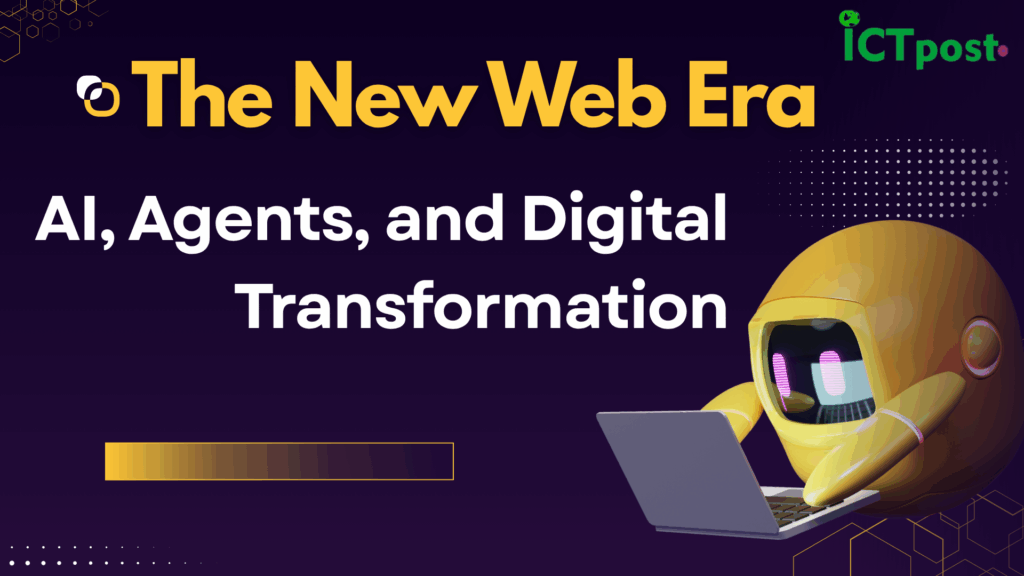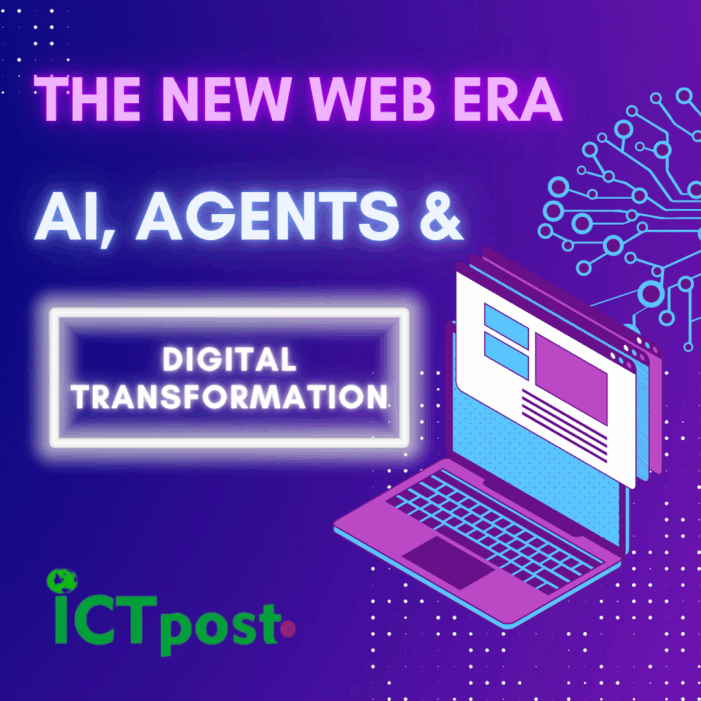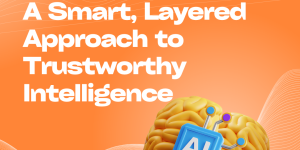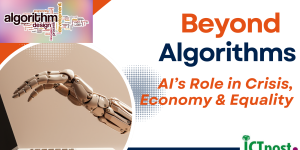ICTpost Research Desk
May 30, 2025 | 3:21 PM IST | New Delhi, India
The Future of the Web: AI is reshaping the web—empowering creators, changing search, and driving an agent-first future. Discover how innovation is redefining digital experiences.
In a recent media interaction, Sundar Pichai, CEO of Alphabet and Google, reiterated a vision he has championed for years: “AI will be as profound as electricity.” But this year, he added a compelling new dimension—describing AI as ushering in a “new phase of the platform shift.”
Unlike previous tech revolutions—from desktop to mobile—this shift is unique because AI is capable of self-improvement at every layer of the technology stack. It’s not just a new product or service; it’s a transformational platform that empowers millions to become creators themselves.
“This is the only platform where the platform itself can evolve and improve autonomously. That’s why it’s so much more profound than any shift before it.”
— Sundar Pichai, Alphabet and Google CEO
Democratizing Creation: The Rise of the AI Builders
Pichai envisions a future where creating software, multimedia content, or digital experiences becomes as simple as having an idea. This is not a distant dream—tools like Google’s Flow (a video creation platform) and NotebookLM (an AI research assistant) are already paving the way.
We are entering a revolutionary era akin to the Web 2.0 days, when users transitioned from passive consumers to active builders of the internet.
“We are just scratching the surface with AI. The next wave will allow anyone to build AI applications without needing to write code. This will multiply creativity and innovation exponentially.”
The analogy is clear: just as blogging exploded in the early internet era, and YouTube surged with the advent of smartphone cameras, AI will unleash a supercharged creative renaissance.
The Web’s Dual Identity: Transaction Hub vs. Media Ghost Town
Since the early 2000s, the internet has evolved dramatically. At its heart is the web—a paradoxical space today. On one hand, it thrives as a platform for dynamic applications and transactions. On the other, it struggles to remain a viable space for media and information publishers.
A Tale of Two Webs
As a transaction platform, the web is arguably at its peak. Google’s AI-powered search now generates instant web applications within search results—allowing users to visualize data or analyze documents in real-time, without leaving the browser. New regulations even require smartphone manufacturers to support web-based transactions, reducing dependency on native apps and strengthening the open web (Source: The Verge).
Conversely, as a media platform, the web is faltering. Nilay Patel, editor-in-chief of The Verge, has remarked that if he were launching a publication today, it would start as a TikTok or YouTube channel—not a website. Why? Because the economics and technology of the modern web increasingly favor video-first platforms, making traditional websites less relevant.
Platforms like Substack or Ghost offer a leaner publishing model but still cannot match the reach or monetization potential of video-centric social media.
Web Applications: The New Creative Frontier
Despite media’s challenges, the creative power of web development has never been stronger. Platforms like Replit enable anyone to “vibe code” — rapidly prototyping and deploying applications directly in the browser. Tech insiders claim this level of accessible development is unprecedented in two decades.
AI-enhanced coding tools are expanding the pool of creators, enabling non-developers to build highly specialized apps for everything from meal planning to real-time political polling.
Google’s Balancing Act
As the most influential search engine, Google’s evolution shapes the web’s future. But the introduction of AI-generated “answer cards” and summaries in search has sparked controversy. Publishers accuse Google of “content theft” and claim it undermines their traffic and revenue.
The News Media Alliance has labeled these moves as harmful to journalism’s economic sustainability.
In response, Sundar Pichai defends Google’s commitment to sending traffic to the web. He insists AI results include source links and improve overall user engagement — though many publishers remain unconvinced, reporting declining readership and revenue.
Is Search Itself Changing?
Complicating matters is the changing nature of search behavior. For the first time in 22 years, Apple revealed that Safari’s search volume declined, signaling a possible shift away from traditional web search .
Consumers increasingly prefer platforms like TikTok and Reddit for search-like experiences. Meanwhile, Google’s AI tools are designed to handle complex, multi-step queries, shifting the way users interact with search and redistributing traffic (Source: The Information).
What’s Really at Stake?
If the web evolves primarily into an application platform while receding as a media distribution channel, the implications for journalism, public discourse, and open information are profound.
The risk is a fragmented digital ecosystem dominated by transactional experiences, where high-quality journalism struggles to survive.
Despite Google’s assurances to continue driving web traffic, the rise of AI-generated answers threatens to marginalize content creators further.

The Next Frontier: Agent-First Web and the Rise of Intelligent Intermediaries
Demis Hassabis, co-founder of DeepMind, envisions a web in ten years that might look nothing like today’s page-based model. Instead, we may interact with AI agents that query multiple databases and services on our behalf—seamlessly planning trips, ordering food, or booking rides without navigating multiple apps (Source: MIT Technology Review).
This “agent-first” web threatens to reduce platforms like Uber or DoorDash to mere data providers, stripped of direct customer relationships. Companies may resist losing their brand identity and upselling power to these agents.
Interestingly, this evolution may happen faster in enterprises, where CIOs demand seamless integration and interoperability between legacy systems and new platforms (Source: Gartner).
Friction, Incentives, and the Path Forward
The agent-driven web isn’t guaranteed. Technical and economic friction could slow adoption. But history shows innovation wins when it removes friction and improves experience.
Just as credit cards survived transaction fees and retailers survived e-commerce, businesses may find that cooperating with AI agents boosts visibility and revenue—despite ceding some control.
Ultimately, users will decide. If AI agents make life easier and faster, adoption will soar. Companies that resist risk being sidelined; those that embrace change may discover new growth avenues.
The Web as a Living System
The future of the internet isn’t static pages but a dynamic, intelligent ecosystem—a living system of data, AI, and human interaction.
From YouTube adapting to TikTok’s rise, to enterprises piloting AI agents, the web is evolving rapidly. The question is not whether this change will happen, but who will lead it.
For creators, businesses, and users alike, the future belongs to those ready to innovate, adapt, and harness the full power of AI-driven digital transformation.
For more insightful articles on technology trends and digital innovation, visit ICTpost.com.









